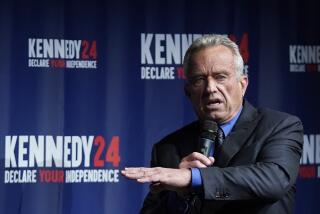White House Works to Defeat a Torture Ban
The White House on Tuesday defended its efforts to head off new restrictions on the U.S. treatment of war prisoners as the issue moved toward a showdown in Congress that has attracted worldwide interest.
White House Press Secretary Scott McClellan said Vice President Dick Cheney was representing the views of President Bush in lobbying lawmakers to exempt the CIA from legislation that would ban the inhumane treatment of suspected terrorists and other detainees.
McClellan said existing laws and regulations were adequate to prevent torture of the prisoners, including those held in what were reported to be secret CIA-operated facilities in Eastern Europe.
“We follow those laws and rules,” McClellan said. “What we need to make sure is that we are able to carry out the war on terrorism as effectively as possible.”
The White House’s aggressive lobbying comes as House and Senate negotiators are considering a torture ban that, as an amendment to a defense spending bill, breezed through the Senate last month on a 90-9 vote.
The escalating debate is being watched in other countries. Some critics of the U.S. have interpreted the administration’s aversion to new restrictions as confirmation that it favors the use of torture as an interrogation tactic.
The torture ban, which was omitted from the House version of the defense spending bill, would make the Army Field Manual the authority on interrogations and would bar all U.S. government agencies from “cruel, inhuman or degrading treatment” of prisoners.
House Speaker J. Dennis Hastert (R-Ill.) on Tuesday postponed formal discussions on the amendment until next week.
But a House GOP leadership aide said top House and Senate lawmakers had been unofficially meeting on the torture ban amendment, which was proposed by Sen. John McCain (R-Ariz.).
McCain last week succeeded in attaching his amendment to another defense-related bill. And he has threatened to embarrass the administration by adding it to every major piece of legislation in the Senate until it is approved.
As Congress considers the torture ban, the Army is scrambling to tighten its rules for prisoner interrogation.
Army Secretary Francis J. Harvey plans to enact 204 “corrective actions” in a new draft of the Army Field Manual and other directives, Army officials said.
Criticism of U.S. interrogation tactics was largely sparked by photographs of naked and hooded detainees being abused at the Abu Ghraib military prison outside of Baghdad. The photographs were released last year, and several soldiers have been prosecuted on charges stemming from the abuse.
Harvey said officers were rewriting the Army guidelines to specifically prohibit the use of dogs in interrogations and other practices.
One of the new rules would clarify the chain of command for military prisons. For instance, a military police commander -- not a military intelligence officer -- must be in charge of the detention facility.
“Military police -- their basic instructions are to provide a safe and secure environment for detainees,” said Army Col. Peter M. Champagne, who is in charge of overseeing the changes. “They’re not really involved in interrogations.”
Medical personnel, who were criticized in a New England Journal of Medicine article for allegedly helping spot physical and mental vulnerabilities in prisoners, would be barred from giving information to interrogators, officials said.
Other changes would require a senior officer and a senior noncommissioned officer to be inside a prison at all times, demand that soldiers handling detainees be certified by the Army, and require autopsies for all detainees who die in custody.
Red Cross reports would have to be sent to commanders within 24 hours. Contractors would be required to have the same training as Army troops and would be monitored.
In a contentious exchange with White House reporters Tuesday, McClellan said Cheney’s lobbying efforts were intended to preserve the ability to question suspected terrorists aggressively, “consistent with our laws and values.”
McClellan denied that the CIA exemption sought by the vice president would allow intelligence operatives to torture foreign detainees to extract information about suspected terrorist plots.
“We are going to do what is necessary to protect the American people,” McClellan said. “We are also going to do so in a way that adheres to our laws and our values.... The president has made it clear to everybody within this government that we do not engage in torture.”
McClellan declined to specify what practices Cheney was trying to preserve in his discussions with lawmakers.
“I’m not going to get into talking about national security matters,” he said. “I don’t do that because this involves information that relates to doing all we can to protect the American people.... Obviously, some of you in this room have a different view.”
Staff writer Richard Simon in Washington contributed to this report.
More to Read
Get the L.A. Times Politics newsletter
Deeply reported insights into legislation, politics and policy from Sacramento, Washington and beyond. In your inbox three times per week.
You may occasionally receive promotional content from the Los Angeles Times.






